#Bangladeshi rally
Explore tagged Tumblr posts
Text
Bangladeshi Infiltration Taking Over Jharkhand: Shivraj Singh Chouhan
Central Minister Shivraj Singh Chouhan criticizes Jharkhand government, accuses it of harboring Bangladeshi infiltrators. Central Agriculture Minister Shivraj Singh Chouhan lashed out at the Hemant Soren-led government in Jharkhand, accusing it of turning the state into a haven for Bangladeshi infiltrators. JAMSHEDPUR – Speaking at an event in Bokaro, Union Minister Shivraj Singh Chouhan claimed…
#मुख्य#Bangladeshi infiltration#BJP Jharkhand#Congress criticism#Featured#Hemant Soren#Jharkhand elections#Jharkhand Politics#NDA government#political rally Jharkhand#Saraswati Shishu Mandir Bokaro#Shivraj Singh Chouhan
0 notes
Text
i’m gonna guess it’s for the audience’s benefit that they don’t have yaz’s nani speaking all her dialogue in urdu to her family. either that or desi brits are more accustomed to speaking english among themselves.
EDIT: never mind i’m incredibly dumb the episode’s literally titled demons of the PUNJAB ofc they speak punjabi but also mandip’s family do speak it & she at least understands it okay I’ll shut tf up now
#couldn't be me as a bangladeshi ppl lit rally died to be able to speak it so yeah i do with my family as much as possible#as bastardized with occasional bits of english integrated as i do#also my own nanu didn't really speak english so that probably colors my perception quite a bit#then again a lot of ppl my age in the bengali community apparently don't bother learning so maybe it's a case of yaz can't speak urdu#obviously idk if mandip is fluent in it or not#zima watches dw
0 notes
Text
Paresh Rawal apologises after ‘cook fish for Bengalis’ remark stokes controversy
Paresh Rawal apologises after ‘cook fish for Bengalis’ remark stokes controversy
Actor and former MP Paresh Rawal has apologised after landing in controversy and facing backlash over his “cook fish for Bengalis” comment at a rally in Gujarat’s Valsad. Rawal had said the people of Gujarat are willing to tolerate inflation but not “Rohingya migrants and Bangladeshis” living next door. The actor and former MP said in a now viral video, “Gas cylinders are expensive, but their…
View On WordPress
#Gujarat Elections#gujarat elections 2022#gujarat elections latest#gujarat elections news#gujarat elections update#gujarat elections updates#Paresh Rawal#Paresh Rawal bangladeshi muslims#Paresh Rawal bengalis#Paresh Rawal cook fish for bengalis#Paresh Rawal election rally#Paresh Rawal rohingyas#Paresh Rawal twitter#Paresh Rawal valsad#Paresh Rawal valsad rally
0 notes
Text
I often post about Palestine but I'd like to take a moment to talk about what's happening in Bangladesh.
KEEP YOUR EYE ON BANGLADESH
TL;DR Students killed for protesting the government's quota system. Students are being arrested and murdered for speaking up about their deceased friends. Everyone is being threatened by the government and many social media platforms are being banned.
All I'm asking is to spread the word. Please. International pressure really works for our nation. We're dying here. UNICEF reports 34 children dead. There might be more. All reblogs and likes and shares are appreciated. Thank you. I guess I'll see you tomorrow.
Past
A movement protesting the government's quota system put forth by the father of our nation Sheikh Mujibur Rahman. This was placed in the first place to help the grandchildren of those who fought in the Liberation War of our country to get government jobs. We have a terrible job market here which is why many highly educated people leave the country. On 16th July, While protesting, a Student named Abu Sayed of Begum Rokeya University was killed by the police. This only stoked the feelings of injustice between the students.
During a press conference, the PM was asked about the quota for the grandchildren of veterans. Her response? "If we don't give jobs to the grandchildren of Veterans, will we give jobs to the grandchildren of Razakars?" Razakars are the people who collaborated with the Pakistani Forces to bring down the Bangladeshi freedom fighters. They betrayed the nation for their own gain.
Traitors.
Imagine calling the youth of your nation traitors.
Imagine calling almost 14 million young people who can't find a job despite their credentials betrayers.
Imagine cursing people who are protesting for job equality under a government with the all time highest corruption in the history of this nation.
On 17th July the broadband connection centre in Mohakhali was burned down. Mobile data services and communication were shut down by the PM. After 11 days the internet was properly restored.
On 19th July, A National Military Curfew was put in place by the Prime Minister to mitigate the unrest.
But that was last month. If you need details I highly recommend sources in Bangladesh like the Daily Star or reputable like Al Jazeera. The quota has since been lifted. Lives were lost. But it was for a good cause, right?
Right?
RIGHT?
Present
Well no. There's still a curfew in the capital. Several districts like Cumilla are still under attack. The government warns of not spreading misinformation yet still lie about the severity of the issue. The police are arresting those who protest as well as those who speak up. The students are demanding for the resignation of the PM. The PM obviously refuses to apologise or even acknowledge the deaths of some 147?
or is it 200?
They're not counting how many they're killing. They're not letting anyone else count either.
It is midnight here. This morning as in 4th August 2024, the students have called for a non cooperation movement. The Ruling Party Awami League will also be holding rallies across the nation tomorrow. I do not know what is going to happen to me. I do not want to think of what will happen to my family tomorrow. I don't really care. What I'm truly scared for is the future. As these protests do not end well here.
Future
Precedence says the PM will eventually resign. Every student protest of our nation has ended in momentary success.
Momentary
What comes after is usually a military regime. A caretaker government until a next government is chosen in a supposed election. Even then if they decide to hold an election. The caretaker government is usually run as a dictatorship. It was true for the 60s. It was true for the 90s. I don't doubt it will happen again.
I'm graduating next year. My niece is still new to the academic system. I wish her the best. My grandmas and grandpas are dead. Nobody left to pray for me. My aunts and uncles are growing old. My cousins can't speak up for fear. My mom is so tired. My dad is angry. I'm unsure if I will still be able to post the next couple of days.
All I'm asking is to spread the word. Please. International pressure really works for our nation. We're dying here. UNICEF reports 34 children dead. There might be more. All reblogs and likes and shares are appreciated. Thank you. I guess I'll see you tomorrow.
#bangla tag#bangladesh#save bangladeshi students#save Bangladesh#bengali#house of the dragon#supernatural#hetalia#fnaf#motogp#deadpool#deadpool and wolverine#lana del rey#olympics#welcome to the table#ben brainard#wttt#welcome to the statehouse#wttsh#john oliver#community#ian duncan#tommy says#current events#politics
138 notes
·
View notes
Text
16 notes
·
View notes
Text
Bangladesh's Historic Pride Walk
Rongdhonu Shovajatra ( means "Rainbow Rally" in Bengali) was an annual pride held in Bangladesh. The pride rally was organized by Roopbaan. In 2014, during the Bengali New Year, members of Roopbaan and LGBTQI+ community participated in a parade in Sahabaag, Dhaka. It was a significant moment that remains memorable for many Bangladeshis, especially Queer Bangladeshis. However the Rongdhonu Shovajatra garnered considerable media attention and faced both support and backlash.
The pride was attended by many notable LGBTQI+ icons, such as, Xulhaz Mannan, Mahabub Rabbi Tonoy, Joya Shikder, Tanvir Annoy, Tanveer Rouf, Mazharul Islam, Rasel Ahmad, etc.
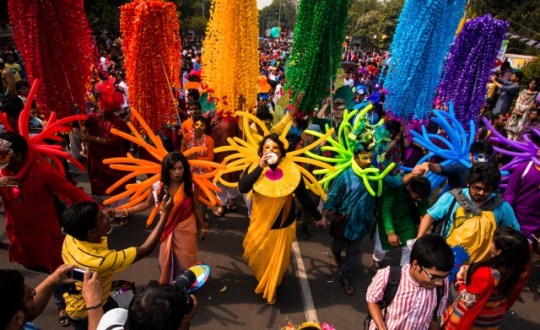
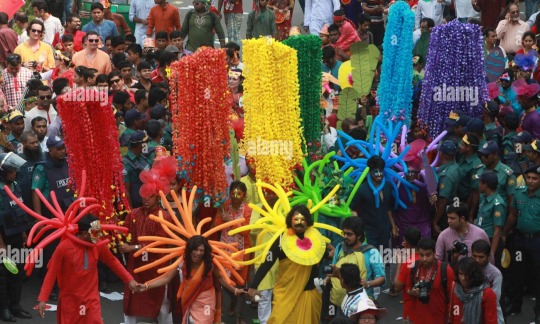
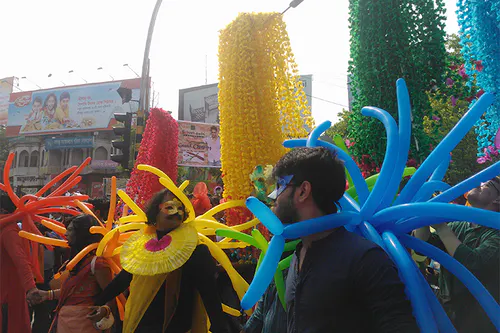
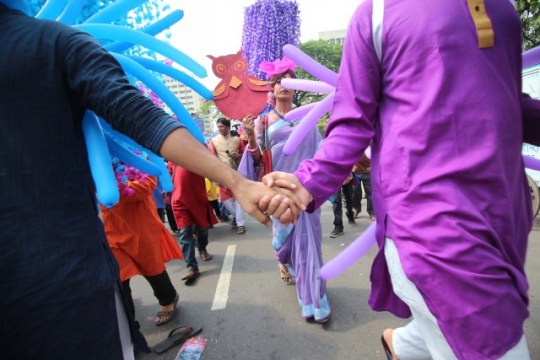
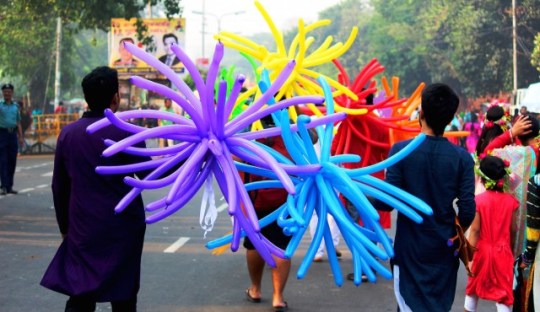

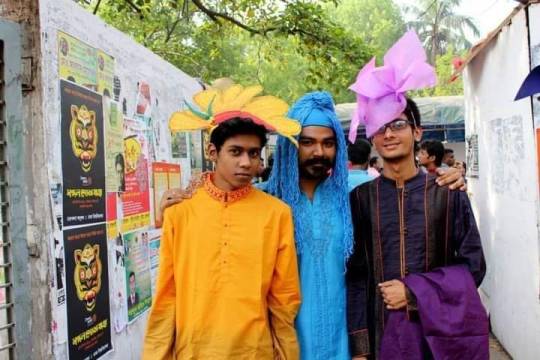
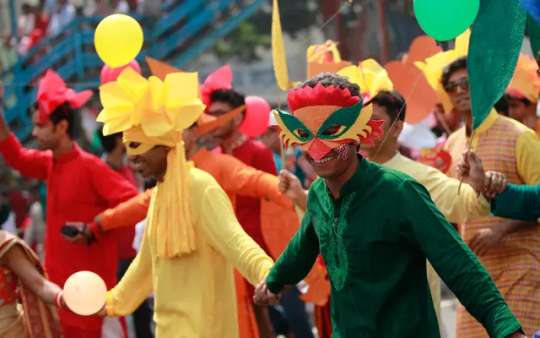
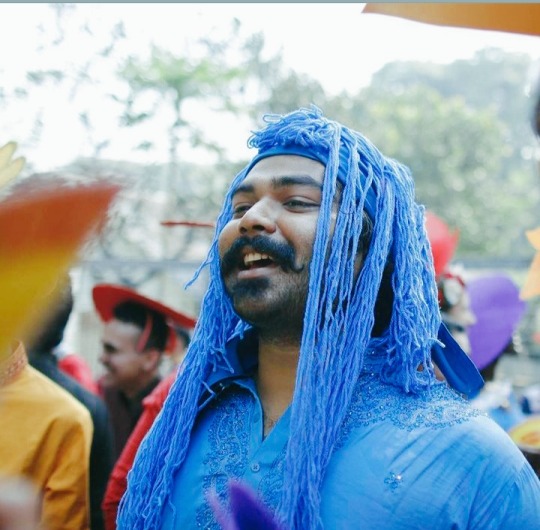
#pride#pride parade#lgbtqia#new year#bangladesh lgbtq#queer rights#asia#queer history#bangladesh#pohela boishakh
15 notes
·
View notes
Text
Three student protest leaders who helped co-ordinate the recent rallies in Bangladesh have been forcibly removed from hospital by police officers, the BBC understands.
Nahid Islam, Asif Mahmud and Abu Baker Majumder were taken from Gonoshasthaya Hospital in the capital, Dhaka, hospital staff said on Friday.
Staff members said the officers, who were dressed in plainclothes, had forced their discharge despite the misgivings of medics at the hospital.
The three men were being treated for injuries that they said were caused by torture and beatings they received in earlier police custody.
"They took them from us," Gonoshasthaya hospital supervisor Anwara Begum Lucky told the AFP news agency.
"The men were from the Detective Branch."
She added that she had not wanted to let the students go, but police had pressured the hospital chief to discharge them.
Mr Islam's elder sister Fatema Tasnim told AFP from the hospital that six plainclothes detectives had taken all three men.
Nahid Islam told reporters last week he feared for his life.
He was kidnapped from a friend's house last week, interrogated and subjected to physical and mental torture by people claiming to be detectives.
He says he fainted and when he regained consciousness, walked home and sought hospital treatment for blood clots on both shoulders and his left leg.
In response to his allegations, Information Minister Mohammad Ali Arafat told the BBC the incident would be investigated but that he suspected "sabotage" - that someone was trying to discredit the police.
Police have arrested more than 4,000 people since the unrest broke out last week.
All three students are members of Students Against Discrimination, the group responsible for co-ordinating this month's street rallies against civil service hiring rules.
The trio's student group had suspended a further wave of protests at the start of this week, due to the bloodshed.
At least 150 people have been killed as a result of nationwide clashes between police and university students, with security forces accused of using excessive force.
Protesters had been calling for quotas on government jobs to be scrapped.
Bangladesh had reserved about 30% of its high-paying government jobs for relatives of those who fought in the country's war for independence from Pakistan in 1971.
Bangladesh's top court has now rolled back most of these quotas and ruled that 93% of roles would now be filled on merit - meeting a key demand of protesters.
At the beginning of the protests the government imposed an unprecedented communications blackout, shutting down the internet and restricting phone services.
Earlier this week, Bangladesh's leader Sheikh Hasina was accused of crying "crocodile tears" after she was photographed weeping at a train station that was destroyed during anti-government protests.
She has disregarded criticism that her security forces deploy excess force to quell the unrest, and instead blamed her political opponents for the wave of violence.
Some student leaders have vowed to continue protesting to demand justice for protesters killed and detained in recent days.
They are also seeking the resignation of government ministers and an apology from Ms Hasina.
3 notes
·
View notes
Text
By Cheryl LaBash
Dec. 25 – Today’s amazing Hamtramck-Detroit-Dearborn Shut it Down for Palestine caravan was sparked by a simple graphic shared on social media, spread by word of mouth. There was no organization calling it, no supporting organizational logos.
Cars gathered at a parking lot in Hamtramck, a small historically migrant town within Detroit – formerly Polish and Eastern European but now mostly Muslim Bangladeshi and Yemeni. Flags, large and small, hand-lettered signs decorated cars, stretched across car hoods and poked out of retracted moon roofs.
#FreePalestine#GazaGenocide#CeasefireNow#car caravan#Detroit#protest#solidarity#Cheryl LaBash#Struggle La Lucha
9 notes
·
View notes
Text
Hindu Sanatan Samaj Stages Protest Rally in West Singhbhum Against Atrocities on Hindus in Bangladesh
Thousands participate in Chakradharpur rally; call for Bangladeshi nationals to leave India. In a significant protest, Hindu Sanatan Samaj organized a massive rally in Chakradharpur, West Singhbhum, condemning the recent attacks on Hindus in Bangladesh and demanding justice. CHAKRADHARPUR – Hindu Sanatan Samaj led a large protest rally in Chakradharpur, West Singhbhum, against the atrocities…
#राज्य#Bajrang Dal protest#Bangladesh Hindu atrocities#Chakradharpur market shutdown#Chakradharpur rally#communal tensions#expulsion of Bangladeshis#Hindu organizations rally#Hindu Sanatan Samaj protest#state#VHP protest#West Singhbhum protest
0 notes
Text
3 notes
·
View notes
Text

Last week, in Bangladesh there was severe violence and unrest after student protests against a controversial government quota system for civil-service jobs escalated. Initially peaceful demonstrations on university campuses were met with attacks from government-backed counter-protestors and excessive force from the police, including the Rapid Action Battalion (RAB), known for its human-rights abuses. This led to violence, with nearly 200 students killed and thousands injured. The government has imposed curfews, internet blackouts, and arrested around 2,400 people.
The unrest began after the High Court reinstated a quota system allocating 30% of government jobs to descendants of 1971 war veterans, despite these individuals constituting less than 0.02% of the population. Students also criticized the perceived corruption in awarding these quotas. With limited job opportunities and ongoing economic instability, students' futures are increasingly uncertain.
In response, Bangladeshi diaspora, including Jennifer, a British-Bengali student, organized solidarity rallies in London and condemned the government's actions. Nijjor Manush, a community group she is involved with, has called for an end to the repression, criticized British involvement in training the RAB, and coordinated a statement with UK academics and student groups. The Bangladeshi Supreme Court has since reduced the quota, but student protests will continue if further demands, including resignations and compensation, are not met.
4 notes
·
View notes
Text
Events 11.3 (after 1960)
1960 – The land that would become the Great Swamp National Wildlife Refuge is established by an Act of Congress after a year-long legal battle that pitted local residents against Port Authority of New York and New Jersey officials wishing to turn the Great Swamp into a major regional airport for jet aircraft. 1961 – U Thant is unanimously appointed as the 3rd Secretary-General of the United Nations, becoming the first non-European individual to occupy the post. 1964 – Lyndon B. Johnson is elected to a full term as U.S. president, winning 61% of the vote and 44 states, while Washington D.C. residents are able to vote in a presidential election for the first time, casting the majority of their votes for Lyndon Johnson. 1967 – Vietnam War: The Battle of Dak To begins. 1969 – Vietnam War: U.S. President Richard M. Nixon addresses the nation on television and radio, asking the "silent majority" to join him in solidarity on the Vietnam War effort and to support his policies. 1973 – Mariner program: NASA launches the Mariner 10 toward Mercury. On March 29, 1974, it becomes the first space probe to reach that planet. 1975 – Four Bangladeshi politicians are killed in the Dhaka Central Jail. 1978 – Dominica gains its independence from the United Kingdom. 1979 – Greensboro massacre: Five members of the Communist Workers Party are shot dead and seven are wounded by a group of Klansmen and neo-Nazis during a "Death to the Klan" rally in Greensboro, North Carolina, United States. 1980 – A Latin Carga Convair CV-880 crashes at Simón Bolívar International Airport in Venezuela, killing four. 1982 – The Salang Tunnel fire in Afghanistan kills 150–2000 people. 1986 – Iran–Contra affair: The Lebanese magazine Ash-Shiraa reports that the United States has been secretly selling weapons to Iran in order to secure the release of seven American hostages held by pro-Iranian groups in Lebanon. 1986 – The Compact of Free Association becomes law, granting the Federated States of Micronesia and the Marshall Islands independence from the United States. 1988 – Sri Lankan Tamil mercenaries attempt to overthrow the Maldivian government. At President Maumoon Abdul Gayoom's request, the Indian military suppresses the rebellion within 24 hours. 1992 – Democratic Arkansas Governor Bill Clinton defeats Republican President George H. W. Bush and Independent candidate Ross Perot in the 1992 United States presidential election. 1996 – Abdullah Çatlı, the leader of the Turkish ultranationalist organization Grey Wolves, dies in the Susurluk car crash, leading to the resignation of Interior Minister Mehmet Ağar (a leader of the True Path Party). 1997 – The United States imposes economic sanctions against Sudan in response to its human rights abuses of its own citizens and its material and political assistance to Islamic extremist groups across the Middle East and East Africa. 2014 – One World Trade Center officially opens in New York City, replacing the Twin Towers after they were destroyed during the September 11 attacks. 2020 – The 2020 United States presidential election takes place between Democratic Joe Biden and Republican incumbent President Donald Trump. On November 7, Biden was declared the winner.
0 notes
Text
Protests rage over attacks against Hindus in Bangladesh
New Post has been published on https://sa7ab.info/2024/08/16/protests-rage-over-attacks-against-hindus-in-bangladesh/
Protests rage over attacks against Hindus in Bangladesh


The leader of the interim government has condemned the atrocities, describing them as “heinous”
Protests have erupted in Bangladesh over communal violence that has been reported following the ouster of Prime Minister Sheikh Hasina and the swearing-in of an interim government. Hasina resigned last Monday and fled to India after weeks of nationwide student demonstrations over a quota system for government jobs, which was criticized for favoring people with connections to Hasina’s Awami League party. The protests started peacefully but quickly turned violent, reportedly resulting in more than 400 deaths. An interim government was sworn in on Thursday with Mohammad Yunus, a Nobel Peace Prize winner known for pioneering the concepts of microcredit and microfinance, as its chief adviser – a position equivalent to prime minister. Dozens of Hindus have been injured in attacks on their homes and businesses since Hasina’s departure, according to reports in Bangladeshi and Indian media. Hindus make up about 9% of the population in Bangladesh, a Muslim-majority nation. The Hindu community has historically supported Sheikh Hasina’s predominantly secular Awami League party, which has fostered close ties with New Delhi in the past decade.
Read more
A serious crisis is brewing on India’s doorstep, and the West has a role in it
Over the weekend, hundreds of thousands of people participated in rallies in Dhaka and Chittagong, the two largest cities, to demand the safety of Hindus and punishment for those who attack them, local media reported. The protesters demanded the allocation of 10% of parliamentary seats for minorities, and the enactment of a minority protection law. Yunus has condemned the attacks against Hindus, describing them as “heinous.�� He has urged students at the forefront of the protests to protect Hindu, Christian, and Buddhist families from harm. On Sunday, the interim cabinet said in its first official statement that it had noted attacks on religious minorities in some places “with grave concern.” Similar protests have taken place in neighboring India, where there is a Hindu majority. New Delhi has also set up a special committee to monitor alleged attacks against Hindus and the situation along the country’s 4,000km border with Bangladesh. Amid the spiraling violence, Indian security forces have stopped dozens of people from crossing the border. While congratulating Yunus on his appointment as the leader of the interim government, Indian Prime Minister Narendra Modi also called for the protection of Hindus and other minorities in Bangladesh. Protests have also been held in the US to condemn the alleged atrocities. On Sunday, around 300 Indian Americans and Bangladeshi-origin Hindus gathered at Sugar Land City Hall in Houston to protest. On Friday, a large number of people protested outside the White House in Washington, demanding justice for minorities in Bangladesh. Meanwhile, several outlets in Bangladesh have suggested that some clips shared on social media purportedly showing violence against Hindus had been taken out of context or were completely ‘false,” and were amplified by the Indian media. Prothom Alo newspaper on Sunday reported, citing a few examples, that some cases of alleged assaults on the Hindu community highlighted by Indian media were false. According to Bangladeshi media, since the government’s fall on August 5, the police have vanished from the streets, creating a law-and-order vacuum, particularly in the capital city Dhaka, where students were seen directing traffic. An AFP report noted that police had vowed not to resume work until their safety on duty was guaranteed after 42 officers were killed during the protests. However, since Monday, police resumed patrols of the capital. Where India Meets Russia: Follow and share RT India on X and Instagram
0 notes
Text
Akhtaruzzaman Chowdhury Babu: A Freedom Fighter’s Journey
Akhtaruzzaman Chowdhury Babu's name resonates deeply in the annals of Bangladeshi history. Known for his business acumen and political prowess, his contributions extend far beyond these domains. Babu was also a dedicated freedom fighter who played a crucial role in the liberation of Bangladesh. His journey from a young man with dreams to a key figure in the country's independence movement is both inspiring and remarkable. Let's take a closer look at the life and legacy of Akhtaruzzaman Chowdhury Babu, focusing on his journey as a freedom fighter.
Early Life
Humble Beginnings
Akhtaruzzaman Chowdhury Babu was born in the serene village of Anwara in the Chittagong district. Growing up in a modest household, Babu learned the values of hard work, perseverance, and community spirit early on. These values would later become the cornerstone of his life's work.
Education and Early Influences
Babu's academic journey began at Patia High School, where his leadership qualities started to shine. He pursued higher education at the University of Dhaka, where he studied Economics. During his university years, he was deeply influenced by the political climate and the burgeoning movement for Bangladesh's independence from Pakistan.
The Call to Arms
Rising Tensions
The late 1960s and early 1970s were a period of intense political turmoil in East Pakistan (now Bangladesh). The oppressive regime of West Pakistan had long marginalized the Bengali population, leading to widespread dissatisfaction and unrest. The call for independence grew louder, and Babu found himself at the heart of this movement.
Joining the Struggle
Inspired by the passionate speeches of Sheikh Mujibur Rahman, the leader of the Awami League, Babu decided to join the fight for his country's freedom. He became actively involved in organizing protests and rallies, mobilizing support for the independence movement.
The War of Liberation
The situation reached a boiling point in March 1971, when the Pakistani military launched a brutal crackdown on Dhaka, marking the beginning of the Bangladesh Liberation War. Babu, like many others, took up arms to defend his homeland. He joined the Mukti Bahini (Liberation Army), where he played a pivotal role in coordinating guerrilla warfare against the Pakistani forces.
Contributions to the Liberation War
Strategic Planning
Babu was not just a fighter; he was a strategist. His background in economics and his analytical mind proved invaluable in planning and executing operations. He worked closely with other freedom fighters to devise strategies that would weaken the enemy's stronghold and boost the morale of the Bangladeshi fighters.
Mobilizing Resources
One of Babu's significant contributions was his ability to mobilize resources. He used his business acumen to secure funds, arms, and supplies for the Mukti Bahini. His efforts ensured that the fighters had the necessary equipment and support to sustain their struggle.
Building Alliances
Babu also played a crucial role in building alliances with international supporters of the Bangladeshi cause. He reached out to various organizations and governments, highlighting the atrocities committed by the Pakistani military and garnering global support for Bangladesh's independence.
The Triumph of Independence
Victory and Aftermath
After nine months of intense fighting, Bangladesh emerged victorious on December 16, 1971. The joy and relief of liberation were palpable, and Babu's role in this monumental achievement was widely recognized. He had not only fought bravely on the front lines but also contributed significantly to the strategic and logistical efforts that led to victory.
Recognition and Honors
In the years following independence, Babu was honored for his contributions to the liberation movement. His name became synonymous with bravery and patriotism, and he was celebrated as a hero of the war. His story inspired countless others, and his legacy as a freedom fighter was firmly established.
Post-Independence Contributions
Rebuilding the Nation
With independence achieved, Babu turned his attention to rebuilding the newly formed nation. He realized that economic stability and growth were crucial for Bangladesh's future, and he poured his energy into business and politics to achieve these goals.
Business Ventures
Babu founded the Akhtar Group, which quickly grew into one of Bangladesh's leading conglomerates. His ventures in real estate, manufacturing, and textiles created jobs and spurred economic development. He was a firm believer in corporate social responsibility, and his businesses often contributed to community welfare projects.
Political Career
Babu's political journey continued as he joined the Bangladesh Awami League. He was elected as a Member of Parliament, where he championed policies aimed at economic reform and social justice. His efforts to improve education, healthcare, and infrastructure were particularly noteworthy, and he remained a beloved figure in Bangladeshi politics until his passing.
Personal Values and Philanthropy
Integrity and Empathy
Throughout his life, Babu was guided by a strong sense of integrity and empathy. He believed in treating others with respect and compassion, values that were evident in both his business dealings and his political career. His ability to connect with people from all walks of life made him a cherished leader.
Philanthropic Efforts
Babu's philanthropy was extensive. He funded schools, hospitals, and community centers, always aiming to uplift the underprivileged. His charitable activities were not limited to financial contributions; he also dedicated his time and resources to mentoring young entrepreneurs and future leaders.
Legacy and Impact
A Lasting Influence
Akhtaruzzaman Chowdhury Babu's legacy is multifaceted. As a freedom fighter, he played a crucial role in securing Bangladesh's independence. As a businessman, he contributed to the nation's economic growth. As a politician, he worked tirelessly for social justice and development. His life story is a source of inspiration for generations to come.
Continued Relevance
Even after his passing, Babu's influence remains strong. His family and followers continue to uphold his values and work towards the betterment of Bangladesh. The institutions and initiatives he established still thrive, serving as a testament to his enduring vision and dedication.
Honoring a Hero
To honor his memory, various scholarships, foundations, and awards have been named after Babu. These initiatives aim to carry forward his legacy of service, leadership, and philanthropy. They ensure that his contributions are remembered and celebrated for years to come.
Conclusion
Akhtaruzzaman Chowdhury Babu's journey as a freedom fighter is a remarkable chapter in the history of Bangladesh. His dedication, bravery, and strategic brilliance played a pivotal role in the country's liberation. Beyond the battlefield, his contributions to business, politics, and philanthropy have left an indelible mark on the nation. As we reflect on his life and legacy, we are reminded of the power of resilience, integrity, and a relentless commitment to the greater good. Babu's story is not just a tale of one man's achievements; it is a beacon of hope and inspiration for all who strive to make a difference.
0 notes
Text
Thousands of Bangladeshi protesters have crowded into a central Dhaka square for mass protests, demanding Prime Minister Sheikh Hasina resign following a deadly police crackdown. Asif Mahmud, one of the key protest leaders in a nationwide civil disobedience campaign, asked supporters to be ready to fight. “Prepare bamboo sticks and liberate Bangladesh,” he wrote on Facebook on Sunday. While the army stepped in to help restore order in the wake of earlier protests, some former military officers have since joined the student movement, and ex-army chief General Iqbal Karim Bhuiyan turned his Facebook profile picture red in a show of support. Army chief Waker-uz-Zaman spoke to officers at the military headquarters in Dhaka on Saturday, telling them the “Bangladesh Army is the symbol of trust of the people”. “It always stood by the people and will do so for the sake of people and in any need of the state,” he said, according to an army statement issued late on Saturday. The statement did not give further details and did not explicitly say whether the army backed the protests. The demonstrations began in early July over the reintroduction of the quota scheme, which reserved more than half of all government jobs for certain groups. It has since been scaled back by Bangladesh’s top court. Rallies against the quotas led to days of mayhem that saw more than 200 people killed in some of the worst periods of unrest during Hasina’s 15-year tenure. Troops briefly restored order but crowds returned to the streets in huge numbers this week in an all-out noncooperation movement aimed at paralysing the government.
continue reading
0 notes
Text
DETROIT − A Michigan city council banned LGBTQ Pride flags from being displayed on all city properties Tuesday night after months of debates.
The Hamtramck City Council voted unanimously on the resolution, introduced by Mayor Pro Tem and Councilman Mohammed Hassan, which also prohibits the display and flying of flags with racist and political views, according to the Detroit Free Press, part of the USA TODAY Network.
Hassan and other members of the council said LGBTQ people and others are welcome in Hamtramck, but need to respect religious freedom. Proponents of the resolution said the Pride flag clashes with their faith, and argued American soldiers sacrificed for the U.S. flag, not the Pride flag.
Before the vote, Hassan blasted critics of the resolution for not respecting the views of Hamtramck residents.
"Please don't threaten us ... I'm the elected official ... I'm working for the people, what the majority of the people like," Hassan said.
Hamtramck, whose population jumped 27% from 2010 to 2020, has the highest percentage of immigrants among cities in Michigan and is the only city in the U.S. with an all-Muslim city council and mayor. About half of the city is either of Yemeni or Bangladeshi descent.
Tuesday’s vote was the latest in an ongoing debate stretching back 15 years over LGBTQ rights in Hamtramck.
In 2008, conservative Christians launched an effort to defeat a ballot proposal in Hamtramck that would have protected gay rights by reaching out to the city's Muslim community to hold rallies and defeat the proposal backed by LGBTQ advocates.
In 2021, then-Mayor Karen Majewski flew the Pride flag outside city hall, which drew criticism from challenger Amer Ghalib who defeated her. On Tuesday, Ghalib spoke out in favor of Hassan's resolution.
"We serve everybody equally with no discrimination, but without favoritism," Ghalib said.
Three city council seats are up for election this year in Hamtramck.
Resolution ‘sends a clear message of discrimination,’ Hamtramck resident says
A majority of the public comments submitted by email and read by Hamtramck City Clerk Rana Faraj at the meeting opposed the resolution.
LGBTQ people and their supporters said the resolution would push them out of Hamtramck and reduce investment in the city. They called the resolution backwards and bigoted.
"The LGBTQ community is the life blood of our organization," executive director of Planet Ant Theatre in Hamtramck Darren Shelton said at the meeting. "I don't think sexuality is a political issue."
Hamtramck resident Hayley Cain said the resolution "sends a clear message of discrimination."
"The Pride flag represents making space for all humans on all the spectrums and this is where we're going as a human species," she said. "You can't stop that."
Some people said Muslim immigrants, who faced discrimination when they immigrated to Hamtramck, should be more sensitive about discriminating against other groups.
27 notes
·
View notes